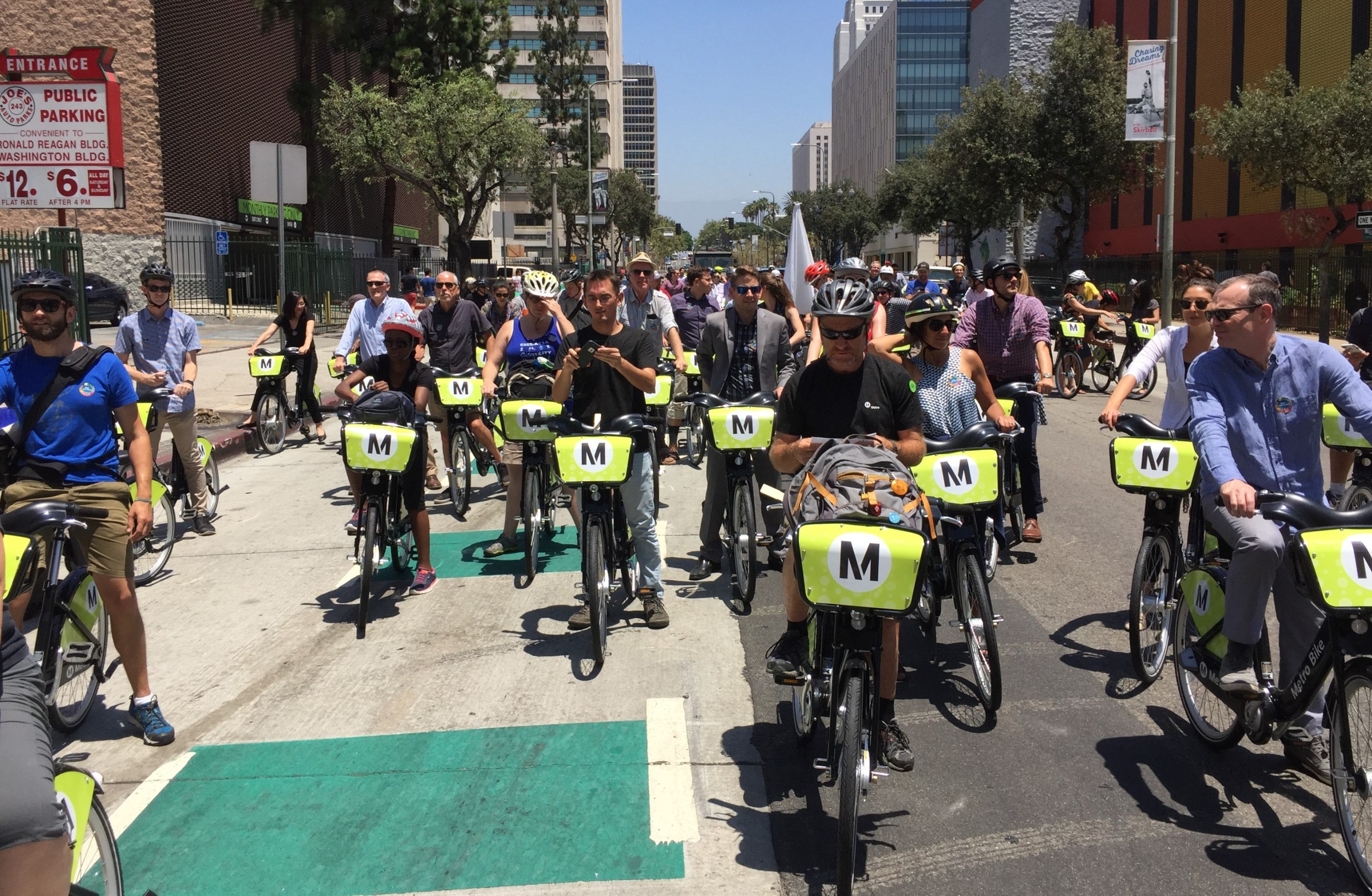LADOT is looking to expand Metro Bike Share operations in the coming years. Today, the L.A. City Council Transportation Committee unanimously approved Department of Transportation recommendations that target 1,000 additional bikes in central Los Angeles and 700 additional bikes on the Westside.
The bike-share proposal will next go to the full city council for approval. With only partial funding for the planned expansion, LADOT will likely seek grant funding to implement expansion.
The city of L.A. currently hosts Metro Bike Share in three areas:
- Downtown Los Angeles - ~1,000 bikes, ~60 stations, opened July 2016 - average 0.74 trips per bike per day
- Venice - ~165 bikes, ~12 stations, opened September 2017 - average 1.2 trips per bike per day
- Port of Los Angeles - ~120 bikes, ~13 stations, opened July 2017 - operated by the Port of L.A.
LADOT has recommended expansion in three areas:
1. Neighborhoods West Of Downtown
LADOT is stressing "contiguous expansion", what SBLA has described in the past as making the "blob" bigger, which is critical for making the overall bike-share system most useful. LADOT is recommending FY 2018-19 expansion to include roughly 700 bicycles in DTLA-adjacent communities of Westlake/MacArthur Park, Silver Lake, Echo Park, Pico Union, and Koreatown. This expansion is unfunded, and is anticipated to costs $900,000 for its initial year.
2. Neighborhoods South of Downtown
By early 2019, under a $2.6 million state Greenhouse Gas Reduction Fund grant, L.A. City and Metro will extend Metro Bike Share to South L.A. communities near USC and along the Metro Expo Line. The expansion will include 22 new stations and 300 new bikes.
3. Westside Neighborhoods
In concert with Culver City's approved bike-share plan, LADOT recommends a Westside L.A. expansion of 700 smart-bikes in FY 2018-19. The smart-bike system will cover the communities of Venice, Palms, Mar Vista, Playa Vista, Playa del Rey, Del Rey, and potentially the L.A. County community of Marina Del Rey. The plan would include swapping out the existing dozen Venice smart-docks into the DTLA area, then featuring only smart-bike systems throughout the Westside. The Westside expansion is not yet funded; the initial year outlay is anticipated to cost $3,400,000.
Future San Fernando Valley Pilot
At the urging of Councilmember Nury Martinez and Transportation Committee Chair Mike Bonin, the Transporation Committee also directed LADOT to work with San Fernando Valley leaders to plan a bike-share pilot in the San Fernando Valley. Martinez expressed her support for LADOT to implement bike-share serving the Valley's Metro Orange Line busway/bikeway.
Questions: Fares, Dockless Bike-Share, and Bike Share Connect
Bike-share is not yet a runaway success in downtown L.A. or even in Venice. At 0.74 rides/bike/day downtown, and 1.2 rides/bike/day in Venice, L.A.'s bike-share lags behind New York City (3.6 rides), Boston, Washington D.C. (both 2.1 rides), Chicago, and San Francisco (both 1.7 rides.) Pasadena Metro Bike Share utilization is so low (0.21 rides) that officials are considering withdrawing.
Metro has been working on promotional discounts and employer programs with some success. Metro is also implementing much more robust TAP integration, likely next year.
Without actually making L.A.'s streets safe for bicycling (unfortunately that's another story), one change that could get more people riding bike-share more often is to bring down the price.
Councilmember Bonin described the current price, $3.50 per ride, as "twice as high as it should be." At today's committee meeting, LADOT Chief Sustainability Officer Marcel Porras mentioned that bike-share "fare restructuring" is anticipated to go to the Metro board next month.
One of the factors potentially driving down Metro Bike Share user costs is competition with dockless bike-share (DoBi). L.A. has seen a proliferation of DoBi bikes in several communities. Typically these private bike-share systems charge $1 per ride. When Porras was questioned about DoBi, he responded that Metro Bike Share was more dependable, with more durable bikes, better serving historically underserved communities, and that public agencies receive dependable data from systems they operate.
Though the city has been tolerating some DoBi trials under somewhat ad hoc pilot arrangements, Bonin announced that proposed LADOT's DoBi regulations are expected to come before the Transportation Committee next month.
In addition to some competition from DoBi, Metro Bike Share on the Westside also competes with what is now calling itself the Bike Share Connect network. Breeze Bike Share, Beverly Hills Bike Share, WeHo Pedals Bike Share, and Bruin Bike Share programs recently fully integrated. Users can now seamlessly ride among those systems, such as riding UCLA bikes into Santa Monica. These are all smart-bike systems run by CycleHop.






